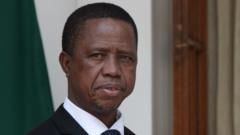The country's approach contrasts with Spain's progressive stance on immigration, raising questions about future policies across Europe.
**Denmark's Shift: When Center-Left Policies Turned Hardline on Immigration**

**Denmark's Shift: When Center-Left Policies Turned Hardline on Immigration**
Denmark's surprising political landscape sees center-left leaders adopting stringent immigration laws amid a backdrop of ongoing migration challenges in Europe.
In the picturesque canals of Copenhagen, where liberal ideals appear to thrive, a stark reality unfolds regarding immigration in Denmark. Once viewed through a progressive lens, Denmark is now recognized as a frontrunner in implementing hardline migration laws, primarily driven by center-left politicians rather than far-right factions. As Europe's migration narrative shifts amidst rising concerns over asylum seekers and economic migrants, questions about the political motivations behind these policies arise.
Marie Sandberg, the Director of the Centre for Advanced Migration Studies at the University of Copenhagen, remarked on Denmark's pioneering restrictive policies. While many associate this political momentum with far-right influences, Denmark showcases a more complex narrative—center-left leaders driving stringent immigration reforms.
The urgency of migration as a voting priority stems from a confluence of factors, including rising geopolitical tensions and deteriorating economic conditions in Europe. The past decade has seen Denmark's immigrant population rapidly increase, leading to heightened scrutiny and a backlash against migration, particularly following the 2015 European migration crisis when a flood of newcomers sought refuge.
During this period, Denmark's hardline stances garnered international attention, marked by policies permitting the confiscation of asylum seekers' valuables to fund their stay. In a striking public relations move, the Danish immigration minister celebrated the passing of tightened immigration amendments with a cake adorned with national symbols. Critics argue that these policies not only strive to curb immigration but also serve to reinforce nationalistic sentiments, with slogans like "Danes First" resonating across the electorate.
Local mayors have raised alarms about the socio-economic strains on communities welcoming migrants. The perception of increased crime associated with immigrants, coupled with concerns over welfare benefits surpassing those of native Danes, has fueled resentment. Consequently, Denmark's call for processing asylum seekers outside its borders has gained momentum, with proposed plans including offshore centers—a notion first entertained but later stalled.
While Denmark's tough laws appear to resonate with the public, uncertainty looms over the impact on its reputation as a bastion of humanitarianism. The Social Democrats, under Mette Frederiksen, heralded a paradigm shift from embracing migration toward adopting increasingly stringent policies in a bid to maintain social cohesion and safeguard public services.
Frederiksen’s maneuvering from traditionally leftist views to adopt hardline policies has garnered support, echoing sentiments seen in political landscapes across Europe. Simultaneously, right-leaning parties have adapted policies typically aligned with left-leaning perspectives, demonstrating a blending of traditional roles.
The outcome of Denmark’s strategic approach remains open to interpretation. On one hand, asylum applications witnessed a significant downturn to levels unseen in decades. On the other, opposition voices argue that Denmark's reputation and compliance with international law have deteriorated, creating a precarious environment for refugees.
In stark contrast, Spain's center-left government is charting a different course. Prime Minister Pedro Sanchez seeks to regularize nearly a million undocumented migrants to bolster the economy and fill labor shortages. Spain's proactive measures aim to strike a balance between welcoming migrants and mitigating public service strains.
Comparing the two nations highlights an ongoing debate on how to effectively address migration in a way that satisfies both economic needs and humanitarian obligations. While Denmark aims for stringent controls, Spain appears more inclined to dependency on immigration to sustain growth amidst demographic shifts.
As European nations navigate diverse migration landscapes, the path forward remains unclear. The challenge lies in transcending political rhetoric while preserving core values of humanity and inclusivity within evolving political doctrines on migration.
Marie Sandberg, the Director of the Centre for Advanced Migration Studies at the University of Copenhagen, remarked on Denmark's pioneering restrictive policies. While many associate this political momentum with far-right influences, Denmark showcases a more complex narrative—center-left leaders driving stringent immigration reforms.
The urgency of migration as a voting priority stems from a confluence of factors, including rising geopolitical tensions and deteriorating economic conditions in Europe. The past decade has seen Denmark's immigrant population rapidly increase, leading to heightened scrutiny and a backlash against migration, particularly following the 2015 European migration crisis when a flood of newcomers sought refuge.
During this period, Denmark's hardline stances garnered international attention, marked by policies permitting the confiscation of asylum seekers' valuables to fund their stay. In a striking public relations move, the Danish immigration minister celebrated the passing of tightened immigration amendments with a cake adorned with national symbols. Critics argue that these policies not only strive to curb immigration but also serve to reinforce nationalistic sentiments, with slogans like "Danes First" resonating across the electorate.
Local mayors have raised alarms about the socio-economic strains on communities welcoming migrants. The perception of increased crime associated with immigrants, coupled with concerns over welfare benefits surpassing those of native Danes, has fueled resentment. Consequently, Denmark's call for processing asylum seekers outside its borders has gained momentum, with proposed plans including offshore centers—a notion first entertained but later stalled.
While Denmark's tough laws appear to resonate with the public, uncertainty looms over the impact on its reputation as a bastion of humanitarianism. The Social Democrats, under Mette Frederiksen, heralded a paradigm shift from embracing migration toward adopting increasingly stringent policies in a bid to maintain social cohesion and safeguard public services.
Frederiksen’s maneuvering from traditionally leftist views to adopt hardline policies has garnered support, echoing sentiments seen in political landscapes across Europe. Simultaneously, right-leaning parties have adapted policies typically aligned with left-leaning perspectives, demonstrating a blending of traditional roles.
The outcome of Denmark’s strategic approach remains open to interpretation. On one hand, asylum applications witnessed a significant downturn to levels unseen in decades. On the other, opposition voices argue that Denmark's reputation and compliance with international law have deteriorated, creating a precarious environment for refugees.
In stark contrast, Spain's center-left government is charting a different course. Prime Minister Pedro Sanchez seeks to regularize nearly a million undocumented migrants to bolster the economy and fill labor shortages. Spain's proactive measures aim to strike a balance between welcoming migrants and mitigating public service strains.
Comparing the two nations highlights an ongoing debate on how to effectively address migration in a way that satisfies both economic needs and humanitarian obligations. While Denmark aims for stringent controls, Spain appears more inclined to dependency on immigration to sustain growth amidst demographic shifts.
As European nations navigate diverse migration landscapes, the path forward remains unclear. The challenge lies in transcending political rhetoric while preserving core values of humanity and inclusivity within evolving political doctrines on migration.





















